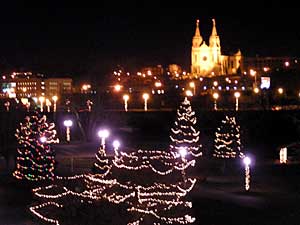I watched a docudrama this weekend on HBO about Tony Blair and Gordon Brown, Blair’s successor for British Prime Minister. (It is a British movie, but HBO picked it up, and I found out about it because “Tony Blair” is a search category in my news reader.) The Deal was made by Stephen Frears who made The Queen, using Michael Sheen for Tony Blair in both.
One of my hobbies/interests (what is the difference between an interest and a hobby?) is British Politics, so I loved The Queen. It was a fascinating look at the modern tension between the roles of monarchy and of representative government with a parliamentary executive. I am one of the only people I know who liked it, which means I had to watch the lesser-known American follow-up The Deal alone. This means there was no one I could ask about the parts I didn’t understand. Having seen The Queen and having remembered the death of Diana and the surrounding coverage, I knew Frears’ method for integrating film footage with actual news clips from that time. I know the news clips in The Deal were monumental moments in British politics, but I had no context or frame of reference, since these events occurred when I was in 5th grade. I have no way of gauging how great the impact of the Blair-Brown rivalry, a key principle in the movie. With the transfer of power in June, the rivalry is now a moot point. I tuned in in medias res, only the beginning seems to have really mattered.
Blair ushered in a new era for Britain, and Brown marks the waning of it. I am looking forward to the next election so that I can start things from the beginning. My natural tendency as a history student is to weigh the present against the past. I want a fresh start so I can do that accurately. What is present now is a past I will know—however small it is.
Brown is to Blair what John Major was to Margaret Thatcher. He illustrates the idea that a change in leadership is hardly the start of something new; in fact, it may bring out the worst in what is left of the old. We saw this with the 2006 election, where there was hope for significant change. The democrats’ seizure of control over congress and the resulting failures, I fear, sets the tone for the next presidency. (People point to the president’s approval ratings when congressional approval ratings are a little to the left of ZERO) It won’t matter who is elected, we will have more of the same.
With Nancy Pelosi, we have the novelty of a woman in the country’s third-highest office. One of Hillary’s most prominent attributes is that she’s a woman who may, by that fact, have something different to offer. One of the faults attributed to Bush is ill-conceived foreign policy, but in Pelosi, we have already seen what a “woman” as to offer. Washington Post commentator Charles Krauthammer points out that what we have is a leader who is “deeply un-serious about foreign policy,” citing, “This little stunt [the Armenian genocide declaration] gets added to the ledger: first, her visit to Syria, which did nothing but give legitimacy to Bashar al-Assad, who continues to engage in the systematic murder of pro-Western Lebanese members of parliament; then, her letter to Costa Rica's ambassador, just nine days before a national referendum, aiding and abetting opponents of a very important free-trade agreement with the United States.”
New leader, new gender, same heedless foreign policy.
In America, as in Britain, vision-driven, principled politics is mired in partisan squabbling. In theory, it is this decline into pointless bickering that marks the end of an era. Unfortunately, I see no presidential candidate who is standing as a light at the end of this tunnel. We need politicians farsighted enough to weigh their present actions against a past that extends farther back than the foibles of George W. Bush. We need a congress that recalls they themselves voted for the War on Terror instead of superficially shifting blame to the machinations of a single man—because our presidential candidates are coming from this congress. We need a leader who will not only start at the beginning, but make a new one, because the politics of in medias res have deprived both voters and leaders of desperately needed context, and therefore foresight.








